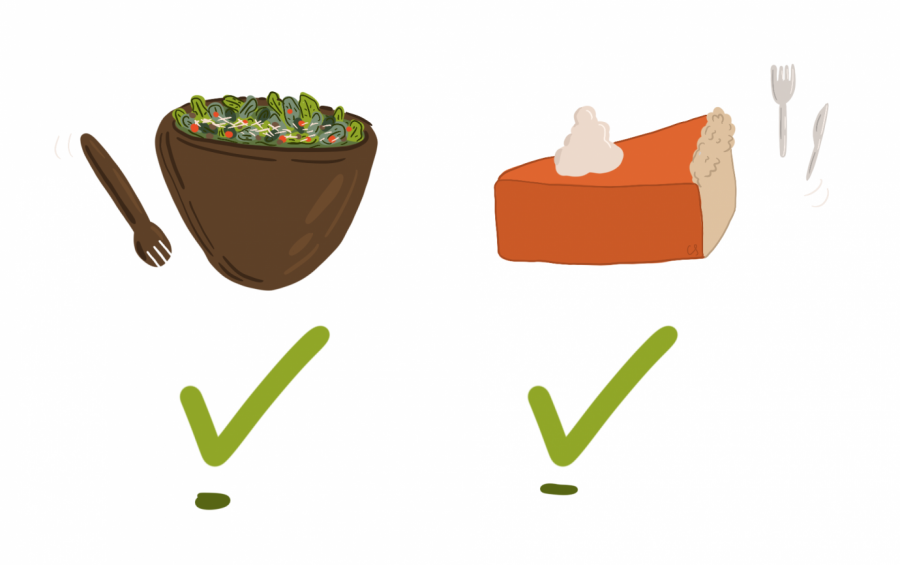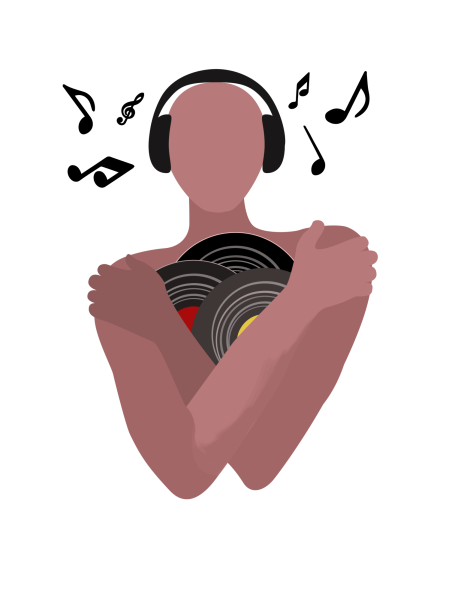Holiday Hacks for Intuitive Eating
For those of you who do not know, America has a bit of a problem with diet culture. Billboards display the preferred body type—usually a 5’10 model weighing 120 pounds. Instagram ads for FitTea, juice cleanses and protein powders dominate people’s feeds. Actors lament the stories of producers who requested they lose weight for a certain role. Despite our country’s obsession with tiny bodies, there is also a raging obesity epidemic. Clearly, something is not working.
In 1995, Evelyn Tribole and Elyse Resch published a book called Intuitive Eating: A Revolutionary Program That Works. This book focused on intuitive eating, the idea that your body knows what food it wants and will eat it if you allow it. However, our diet-obsessed culture has blocked many of our hunger and fullness signs and people no longer listen to their intuitive feelings about food.
During the holidays, the media once again rears its ugly head telling you how and what to eat. How many times have you heard “wear your comfy pants” or “it’s time to unbutton the pants”? Intuitive eaters listen to their hunger and do not overeat— avoiding the discomfort and bloating. Thanksgiving and Christmas do not have to be one-stop shops to fill yourself up with decadent food. Along with the media’s emphasis on food during the holidays, they hit you again on New Years’ to lose weight and focus on your health. Let’s skip the holiday health stress and look at the basic principles of intuitive eating:
- Reject the Diet Mentality: To master intuitive eating, you need to reject any diet practices that you may be holding onto. No counting calories or rules about when to eat. Basically, no restrictions. Trust that your body knows what food it needs.
- Honor Your Hunger: Tribole and Resch make it very clear that this is not a hunger-fullness diet. However, pay attention to your body’s signs. Are you eating socially or because you are actually hungry? This may seem obvious, but eat when you are hungry—you want your brain to trust that you will give it food. Otherwise, you may turn to overeating to compensate.
- Make Peace with Food: Many people forbid high-calorie foods from their diets. However, this forbidden food does not stay off the table as you eventually lose restraint and binge. Permit yourself to eat any and all foods. Your body will guide your food decisions.
- Challenge the Food Police: How often do you find yourself labeling foods as “good” or “bad”? Stop policing the food you eat. Food is food. The idea is that once you take emotions out of your eating, you will just be guided by what you want.
- Discover the Satisfaction Factor: Have you ever been at an uncomfortable dinner or lunch? Do you remember what your food tasted like? The satisfaction factor highlights that you need to appreciate your eating experience.
- Feel Your Fullness: This principle asks you to pause when eating to evaluate your fullness. Trust your body and intuitive eating.
- Cope with Your Emotions with Kindness: After living in diet culture, you probably have a lot of emotions associated with food. Have you heard the term “emotional eating”? This step wants to help you with any emotional eating. Find new ways to deal with your emotions outside of food.
- Respect Your Body: To accept intuitive eating as not being a diet, you have to practice self-love. While self-love seems overplayed, it is critical. “Just as a person with a shoe size of eight would not expect to realistically squeeze into a size six, it is equally futile (and uncomfortable) to have a similar expectation about body size.” Find clothing you are comfortable in.
- Movement—Feel the Difference: Instead of practicing regimented exercise, find movement that is comfortable for you. Do you feel like dancing? Then dance! Do you feel like walking instead of going for a run? Good for a walk! Let your body move in comfortable ways.
- Honor Your Health—Gentle Nutrition: Intuitive eating is not about restriction. However, Tribole and Resch want to emphasize how healthy eating is beneficial. Nutrition should be about making people feel their best.
Your donation will support the student journalists of Saint Louis University. Your contribution will help us cover our annual website hosting costs.





![The Teskey Brothers [Crew] gather together for a curtain call in front of a raucous St. Louis crowd after a two-song encore. (Photo courtesy of Vertrell Yates / @trellseyephotography)](https://unewsonline.com/wp-content/uploads/2024/05/Screenshot-2024-05-21-232057-600x370.png)









Kerry Ann • Dec 7, 2020 at 10:46 am
Excellent article! Thank you!
Elyse Resch • Nov 25, 2020 at 5:11 pm
Thank you so much for your article. I am hoping that you know that Intuitive Eating came out in June this year in the 4th edition. 25 year anniversary! There’s also The Intuitive Eating Workbook that came out in 2017, The Intuitive Eating Workbook for Teens (which I wrote) that came out in 2019. Next year, on June 1st, The Intuitive Eating Journal–Your Guided Journey forNourishing a Healthy Relationship with Food (which I also wrote) and The Intuitive Eating Card Deck–50 Bite-Sized Ways to Make Peace with Food (which I co-authored) will be released.
Thank you for crediting our book. So few people do!
Have a nice Thanksgiving,
Elyse Resch